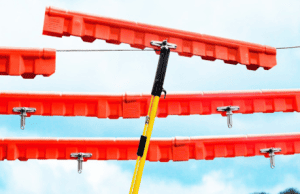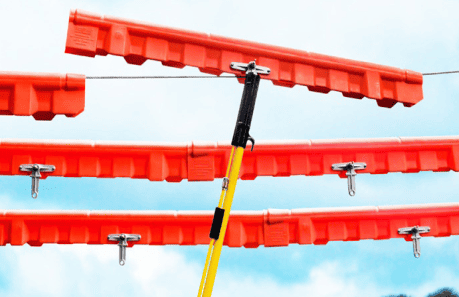Introduction to ASTM F712 & Initial Testing
 ASTM F712 covers the standard test methods and specifications for electrically insulating plastic guard equipment for the protection of workers. However, a notable aspect of F712 is its exemption from requiring initial testing for plastic guards and coverings. This means that after the plastic equipment is manufactured, it is not required to be tested before being sold to the end user. This exemption has sparked debate regarding whether plastic gear should undergo more stringent assessments. In contrast, manufacturers of rubber goods are mandated to conduct initial tests on rubber equipment, raising questions about the rationale behind the disparity. Nevertheless, the significance of conducting an initial test warrants further exploration.
ASTM F712 covers the standard test methods and specifications for electrically insulating plastic guard equipment for the protection of workers. However, a notable aspect of F712 is its exemption from requiring initial testing for plastic guards and coverings. This means that after the plastic equipment is manufactured, it is not required to be tested before being sold to the end user. This exemption has sparked debate regarding whether plastic gear should undergo more stringent assessments. In contrast, manufacturers of rubber goods are mandated to conduct initial tests on rubber equipment, raising questions about the rationale behind the disparity. Nevertheless, the significance of conducting an initial test warrants further exploration.
Is Initial Testing Important?
Initial testing serves to validate the quality of equipment manufacturing, ensuring meticulous execution of molding processes to guarantee safety in usage. So why is an exception made for plastic? Well, for starters, the material properties of plastic are generally more consistent and predictable in their behavior during manufacturing compared to rubber. When taking a look at rubber equipment, oftentimes the molding process for rubber can occasionally encounter issues such as sticking, leading to compromised quality and subsequent failure during the initial testing phase. On the other hand, the manufacturing processes of plastic often result in more uniform properties, reducing the need for initial testing to ensure quality. But does this mean that initial testing for plastic is not needed at all? Cutting out initial tests comes at the cost of higher risk to the end user. Without ensuring that the plastic equipment was manufactured correctly, the only way for end-users to ensure their own safety is to visually inspect the equipment before use. Even this has its risks, however, as it raises questions about the trade-off between efficiency and ensuring reliability.
Implications and Further Directions
If plastic cover-ups were required to be initially tested, what could we expect? First, manufacturers would have to find a means to test the equipment. Not only does this mean added required machinery, but it also means less streamlined production, more hours put into manufacturing, and more sunk costs for manufacturers when a cover-up fails its initial test. This results in marginally higher prices for the end user because of the added resources needed for production. Does this justify putting the end user at more risk by not requiring an initial test? Because plastic equipment is considered secondary cover and the manufacturing of plastic is generally more consistent than rubber, an argument could certainly be made that it is not worth requiring an initial test for all plastic equipment to prevent the rare occasion that one piece of equipment is faulty. After all, it is secondary cover. On the other side of the argument, failure to mandate an initial test for equipment places end users at heightened risk of injury or even death. Sure, it’s rare for the manufacturing of plastic equipment to result in faulty equipment. But without an initial test, is there a way to be sure? So what do you think? Should an initial test be required for plastic equipment?
Contact Us to discuss your electrical safety testing needs

